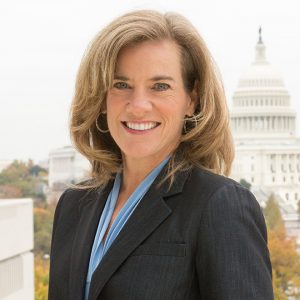
 By BJC General Counsel Holly Hollman
By BJC General Counsel Holly Hollman
When hurricanes, floods, fires and other natural disasters strike, churches and other non-governmental entities are often among the quickest to respond. They work alongside and in conjunction with our government’s first responders to help in various ways, such as opening their doors to provide food and temporary shelter to victims. By using their private resources and organizing their volunteers, such entities demonstrate the call to be a neighbor in ways that Christianity and other religions command.
At times, churches may provide disaster relief services as part of a larger government effort and may be eligible for government funding reimbursements, such as those provided by FEMA (the Federal Emergency Management Agency), consistent with constitutional standards that protect religious liberty. Such funding supports non-religious functions provided by non-governmental entities without risking unconstitutional government funding of religion. That kind of government-financed engagement with nonprofit organizations fits a long-standing model of church-state cooperation and rarely causes controversy.
As announced early this year, however, new FEMA rules are aimed at an entirely different kind of church-state engagement: building churches with tax dollars. Following the devastating damage caused by hurricanes last year, this new approach was asserted as a constitutional right in litigation brought by a handful of churches and synagogues in Texas and Florida. As their pleadings and media efforts indicated, attorneys for the churches claimed that the Supreme Court’s ruling last year in Trinity Lutheran Church v. Comer demanded that FEMA money be made available to rebuild houses of worship. A federal judge rejected their argument and sided with the Baptist Joint Committee and other groups concerned about maintaining church-state separation, saying “the government has a historical and justifiable interest in avoiding an establishment of religion and using public funds to support religion.”
The plaintiffs in the Texas case (which has now been dismissed) and FEMA support a reading of Trinity Lutheran Church that will ultimately harm churches. In Trinity Lutheran Church, the Supreme Court held that Missouri could not exclude churches from a government grant program to resurface playgrounds with scrap tire material.
While the decision marked a step away from the long-standing ban on aid to churches as an essential boundary for protecting religious liberty, it did not usher in a sea change for funding churches. Instead, the Court’s decision emphasized the secular nature of playgrounds and the religiously neutral criteria applied in the competitive program at issue. The new FEMA rule, on the other hand, attempts to advance a new constitutional scheme allowing direct government grants for the building of houses of worship.
As the Trinity Lutheran Church case made its way to the public’s attention, the BJC’s education effort emphasized that churches, by definition, are organized for religious purposes and activities. When government money goes to churches, the Constitution demands safeguards to protect our religious liberty, especially to avoid government funding of religious activities. The Court’s narrowly crafted decision in Trinity Lutheran Church maintains the prohibition on government-funded religious activity, which would certainly be implicated if the government funds the construction of buildings dedicated to religious use.
As Baptists, we are particularly steeped in the historical reasons for avoiding government entanglement in religion, and — like all Americans — we are beneficiaries of a robust religious liberty tradition. A few years ago when arsonists destroyed several African-American churches, the Muslim community raised thousands of dollars to help them rebuild. Such was their free choice. Then and now, the government should not force Americans to build sacred spaces for others.
It is not clear that the proponents of government funding for churches appreciate the practical concerns that will arise and undercut religious liberty. With government money comes government control. That was certainly a concern in the founding era, and in this era of government it is reasonable that when the government funds churches, it will have something to say about how that money is spent. With increased demand and limited government funding, the new rule also puts FEMA in a position to decide which churches among those that have been damaged or destroyed receive government money. That will undoubtedly raise concerns about government favoritism.
In a year with an extraordinary number of natural disasters, churches were centers for providing various kinds of assistance in response to the heartbreaking suffering that accompanies natural disasters. Volunteer efforts, financial support from private sources and government efforts all play a role in recovery. Maintaining adherence to our constitutional tradition that serves religious liberty for all will ensure that churches will continue to play a valuable and trusted role in those efforts.
This article appeared in the January/February 2018 edition of Report from the Capital. You can also read the digital version of the magazine or view it as a PDF.




